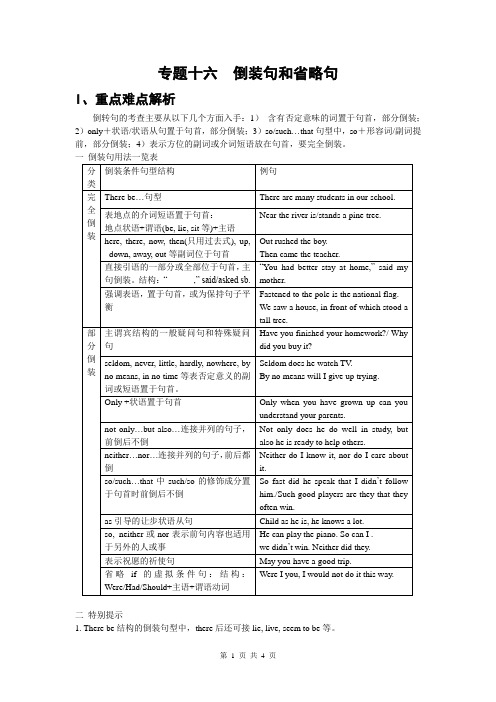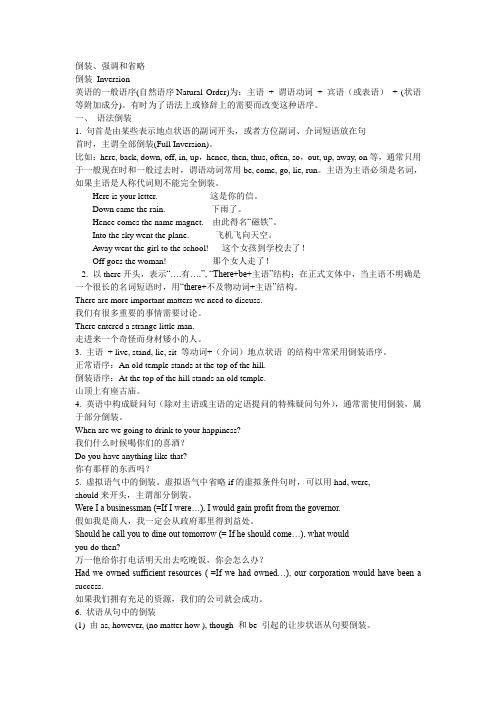倒装和省略
语法中的省略句和倒装句

语法中的省略句和倒装句在语法学中,省略句和倒装句是常见的句型。
省略句指的是在句子中省略某些成分,而倒装句则是改变了正常的词序。
本文将从基本概念、用法及实例等方面详细介绍这两种语法现象。
省略句的定义和用法省略句是指在句子中省略某些成分,但通过上下文可以明确意思。
省略的成分可以是主语、谓语、宾语、状语等。
省略句在英语中常见,可以减少重复,简化句子结构,使语言更加简洁有力。
省略句的用法多种多样,下面将分述几种常见的情况:1. 主语省略:当谓语动词是不及物动词或者使用了“there be”结构时,主语常常省略。
例如:(1) Was late for the meeting.(主语“I”被省略)(2) There is a book on the table.(主语“a book”被省略)2. 谓语省略:当句子的主语和谓语之间存在着某种逻辑关系,且谓语动词与上下文能够呼应时,可以省略谓语部分。
例如:(1) John plays tennis, and Kate does too.(谓语“plays tennis”被省略)(2) Tom likes pizza, and Jerry likes hamburger as well.(谓语“likes pizza”被省略)3. 宾语省略:当上下文已经明确了宾语的内容时,可以省略宾语。
例如:(1) Can you drive?(宾语“a car”被省略)(2) He bought a book, and I bought one too.(宾语“a book”被省略)倒装句的定义和用法倒装句是指将句子中的某些语序进行倒置的一种句型。
正常语序是主语在前,谓语在后,而倒装句则是将谓语提前或将主语放在谓语之后。
倒装句的使用可以起到强调某个部分的作用,改变句子的语气或加强语言表达的效果。
下面列举几种常见的倒装情况:1. 全部倒装:将整个谓语放在主语之前。
例如:(1) Out rushed the students.(主语“The students”在谓语“rushed”之前)(2) Never have I seen such a beautiful sunset.(主语“I”在谓语“seen”之前)2. 部分倒装:将助动词、情态动词或be动词与主语之间的顺序进行倒置。
语法中的省略句和倒装句的常见形式和结构

语法中的省略句和倒装句的常见形式和结构在语法学习中,我们常常会遇到一些特殊的句式,如省略句和倒装句。
省略句是指在句子中省去了部分成分,通过上下文可以推断出省略的内容。
而倒装句则是将句子中的某些成分颠倒位置,以突出某种语气或达到修辞的目的。
本文将详细介绍语法中的省略句和倒装句的常见形式和结构,并通过例句加以说明。
一、省略句的常见形式和结构1. 主语的省略主语的省略是最常见的省略句形式,常出现在特殊疑问句、祈使句和感叹句中。
例如:- Are you coming with us? (主语"You"被省略)- Open the door! (主语"You"被省略)- How beautiful! (主语"It"被省略)2. 谓语的省略谓语的省略常出现在上下文已经明确的情况下,避免重复使用谓语动词。
例如:- I like apples. Kate, too. (省略了第二个"I like")- He can speak English. So can I. (省略了第二个"can speak")3. 宾语的省略宾语的省略通常出现在特殊疑问句和祈使句中,或者通过上下文可以推断出省略的内容。
例如:- Did you buy milk? Yes, I did. (省略了第二个"milk")- Give me some water, please. (省略了第二个"water")4. 宾语补足语的省略宾语补足语的省略常出现在带有情态动词或者某些动词(如see, watch, hear等)的句子中。
例如:- She can play the piano. So can I. (省略了第二个"play the piano")- I heard him speak in Chinese. (省略了第二个"speak in Chinese")5. 状语的省略状语的省略常出现在上下文已经明确的情况下,避免重复使用状语词语。
高考英语语法专题复习-倒装句和省略句

专题十六倒装句和省略句I、重点难点解析倒转句的考查主要从以下几个方面入手:1)含有否定意味的词置于句首,部分倒装;2)only+状语/状语从句置于句首,部分倒装;3)so/such…that句型中,so+形容词/副词提前,部分倒装;4)表示方位的副词或介词短语放在句首,要完全倒装。
二特别提示1. There be结构的倒装句型中,there后还可接lie, live, seem to be等。
例如:There lived an old man in the village long long ago.2. here, there, now, then(只用过去式), up, down, away, out等副词位于句首,主语为代词时不倒装。
例如:Out he rushed.3. 直接引语的一部分或全部位于句首,主句倒装。
但是主语为代词时不倒装。
“You had better stay at home,” she said.4. So位于句首不倒装的情况:主语与前句相同,表赞同, 译为“确实如此”。
例句:---Mike studies hard.---So he does. (确实是。
) 比较: (---So do I .我也是。
)5. 表示前句内容也适用于另外的人或事,前句如果列举了两种事实以上,用“So it is/waswith sb/sth.”回答。
---Tom is kind and often helps those in trouble.---So it is with his father.省略句高考命题导向:省略是一种避免重复,保持简洁的语法手段。
缺少一个或一个以上的必要语言成分,但在一定语境中能够独立存在,意义明确,并且能发挥交际功能的句子叫做省略句。
高考主要是考查省略在固定结构中的运用。
省略句用法一览表II、实战演练根据括号中的提示完成句子。
1.Not until __________________ (I; shout) at the top of my voice ________________ (he; turn) his head.2.I won the prize at last. Never in my life ___________________ (I; feel) so happy.3.Hardly _____________________ (the thief; see) the police ___________ he ran away.4.---Hurry up! There _______________________ ( the bell; go).---My goodness! Has Mrs Li come yet?---Look! Here ___________________ (he; come)5.Not only ___________________ (he; like) singing, but __________________ (he; have)a good voice.6.---David has passed the final exam smoothly.---So _________________ (he; have), and ___________________ (I, have).7.So ____________________ (he; be frightened) in the darkness that he did not dare to move an inch.8.Up _________________________ (the balloon; go) into the air.9.At the foot of the mountain _________________________ (a village; lie)10.I’v tried very hard to improve my English. But by no means _______________________ (the teacher, be satisfied) with my progress.11.If Joe’s wife doesn’t go to the party, neither ______________________.(他也不去)12.Should _________________________ (如果明天下雨), we would have to put off the sports meet.13.Child __________________ (尽管只是孩子), he shows great consideration towards the others.14.---Mike hadn’t passed the exam and was afraid of being scolded.--- ________________________. (我也一样)15.________________________________ (我们一听到铃声) than we rushed into the classroom.16.---He hasn’t finished the work yet.---Well, he _________________.(本该完成)17.The man we followed suddenly stopped and looked as if _______________ (see) whether he was going in the right direction.18.---Is your mother a teacher?---No, but she __________________.(过去是)19.---Do you know Anna’s telephone number?--- _______________ .(恐怕不知) As a matter of fact, I don’t know any Anna, either.20.---Who should be responsible for the accident?---The boss, not the workers. They just carried out the order ____________ (按被告诉的).答案:1. I shouted; did he turn 2. have I felt 3. had the thief seen; when 4. goes the bell; he comes 5. does he; he has 6. he has; so have I 7. frightened was he8.went the balloon 9. lies a village 10. is the teacher satisfied 11. will he 12. it rain tomorrow 13. as/though he is 14. So it was with me. 15. No sooner had we heard the ring 16. should/ought to have 17. to see 18. used to be 19. I’m afraid not 20. as told。
句子的倒装和省略

句子的倒装和省略句子的倒装是英文语法中常见的一种表达形式,指的是动词与主语的位置颠倒,倒装的方式有两种:完全倒装和部分倒装。
同时,省略也是英文语法中常见的一种表达手法,指的是在句子中省略掉某些成分,使得句子更加简洁明了。
在本文中,我们将探讨句子的倒装和省略,以及它们在语言表达中的应用。
一、句子的完全倒装完全倒装是指将谓语动词完全移至主语的前面,常用于以下几种情况:1. 当以here, there或者out等副词开头时:Here comes the bus.(车来了)There goes the bell.(铃声响了)Out came the sun.(太阳出来了)2. 当以否定副词或副词短语开头时:Never have I seen such a beautiful sunset.(我从未见过如此美丽的日落。
)Not only is he intelligent, but he is also hardworking.(他不仅聪明,而且勤奋。
)3. 当以介词短语或表示地点的副词短语开头时:In front of the house stood a tall tree.(房子前面矗立着一棵高大的树。
)On the hill lies a small village.(小山上坐落着一个小村庄。
)二、句子的部分倒装部分倒装是指只将助动词或情态动词移至主语之前,常用于以下几种情况:1. 当以否定词开头时:Never had I imagined that I would win the lottery.(我从未想过我会中彩票。
)Not only does he speak English fluently, but he also speaks French.(他不仅英语讲得流利,而且懂法语。
)2. 当以表示方式或原因的副词或短语开头时:In no way can I accept your offer.(我无论如何都不能接受你的建议。
英语倒装、强调和省略语法点

倒装、强调和省略倒装Inversion英语的一般语序(自然语序Natural Order)为:主语+ 谓语动词+ 宾语(或表语)+ (状语等附加成分)。
有时为了语法上或修辞上的需要而改变这种语序。
一、语法倒装1. 句首是由某些表示地点状语的副词开头,或者方位副词、介词短语放在句首时,主谓全部倒装(Full Inversion)。
比如:here, back, down, off, in, up,hence, then, thus, often, so,out, up, away, on等,通常只用于一般现在时和一般过去时,谓语动词常用be, come, go, lie, run。
主语为主语必须是名词,如果主语是人称代词则不能完全倒装。
Here is your letter. 这是你的信。
Down came the rain. 下雨了。
Hence comes the name magnet. 由此得名“磁铁”。
Into the sky went the plane. 飞机飞向天空。
Away went the girl to the school! 这个女孩到学校去了!Off goes the woman! 那个女人走了!2. 以there开头,表示“….有….”, “There+be+主语”结构;在正式文体中,当主语不明确是一个很长的名词短语时,用“there+不及物动词+主语”结构。
There are more important matters we need to discuss.我们有很多重要的事情需要讨论。
There entered a strange little man.走进来一个奇怪而身材矮小的人。
3. 主语+ live, stand, lie, sit 等动词+(介词)地点状语的结构中常采用倒装语序。
正常语序:An old temple stands at the top of the hill.倒装语序:At the top of the hill stands an old temple.山顶上有座古庙。
省略和倒装语法解释

多变的省略句掌握好省略句,应注意以下几条:1.感官动词或使役动词(如:notice, hear, let, make)等后接不定式作宾补时省略to,被动时to不能省略。
2.在prefer to do rather than…, cannot help but…do, nothing …but等句型中常省略to。
3.为避免重复,作某些动词(hope, want)等宾语或(tell, order, ask)的宾补时,省略不定式短语,只保留to.4.应注意状语从句、定语从句中的省略。
5.注意not ,so ,neither, nor的“替代性”省略。
6.状语从句中,如果谓语含动词be,主语又与主句主语一致或主语是it,从句中主语和be一齐省略。
7.常见的省略形式:(1)If (it is)possible[如果可能的话];(2)If (it is) necessary[如果必要的话];(3)If any: 例: Correct the mistakes in the passage if (there is) any (mistakes)比较:Do you have anything to say? (不知道对方是否有话要说,) Do you have something to say?(认为对方有话要说.)一、替代省略1. 用it, one, that,ones, those替代句子中重复出现的名词、代词或句子。
one是指代同名称的另一样东西(同类异物),代替前面句子中重复出现的可数名词;that替代特指可数或不可数名词,后面常跟有in或of短语作后置定语;it指代同名称的同样事物(同类同物)。
例:One took a taxi, and the other walked home. I haven’t a book, can you lend me one?2."So / Nor(Neither)+谓语+主语"这种句型是用来替代前面提到的情况,表明它也适用于后者。
倒装句与省略句的区别及用法解析

倒装句与省略句的区别及用法解析倒装句和省略句是英语语法中常见的两种特殊句式。
它们的运用可以增加句子的多样性,使语言更加丰富,并帮助我们有效地表达思想。
本文将分析倒装句与省略句的区别,并介绍它们的用法。
一、倒装句倒装句是指在句子中调整主语和谓语的位置,通常有两种情况:完全倒装和部分倒装。
1. 完全倒装完全倒装句的结构为:助动词/情态动词/系动词 + 主语 + 谓语。
常见的倒装情况包括以下几种类型:1.1 肯定形式的完全倒装例如:- "Not only did he finish the project ahead of schedule, but he also exceeded our expectations." (他不仅提前完成了项目,而且超出了我们的预期。
)- "Rarely have I seen such a beautiful sunset." (我很少见到如此美丽的日落。
)1.2 否定形式的完全倒装例如:- "Never have I seen such a funny movie." (我从未见过这么有趣的电影。
)- "Little did they know what awaited them."(他们并不清楚等待他们的是什么。
)1.3 倒装的条件句例如:- "Had I known about the event, I would have attended." (要是我早知道这个事件,我就去参加了。
)2. 部分倒装部分倒装句是指将助动词/情态动词/系动词置于主语前,而谓语动词保持不变。
常见的部分倒装情况有以下几种类型:2.1 含有"only, hardly, rarely, seldom"等副词修饰状语从句的部分倒装例如:- "Only in this way can we achieve success." (只有通过这种方式,我们才能取得成功。
倒装与省略

倒装句一、全部倒装全部倒装是指将句子中的谓语动词全部置于主语之前。
此结构通常只用与一般现在时和一般过去时。
常见的结构有:1.here, there, now, then, thus等副词置于句首,谓语动词常用be, come, go, lie, run。
There goes the bell.铃响了。
2.表示运动方向的副词或地点状语置于句首,谓语是表示运动的动词。
In came the teacher.老师进来了。
注意:上述全部倒装的句型的主语必须是名词,如果主语是人称代词则不能完全倒装。
Here he comes. 他来了。
3.表地点的词语置于句首或强调地点概念时用全部倒装。
On the table were some flowers.桌子上有一些花。
二、部分倒装部分倒装是指将谓语的一部分如助动词或情态倒装至主语之前。
如果句中的谓语没有助动词或情态动词,则需添加助动词do, does或did,并将其置于主语之前。
常见的情况有:1.带有否定意义的词或短语放在句首,语序需要部分倒装。
常见的词语有:not, never, seldom, scarcely, barely, little, at no time, not only, not once, under no condition, hardly... when, no sooner... than..., not until...等。
Neither will theory do without practice,nor will practice do without theory.理论离不开实践,实践也离不开理论。
Not only did he refuse the gift, he also severely criticized the sender.他不仅拒收了礼品,还狠狠批评了送礼的人。
注意:当not until引出主从复合句时,主句倒装,从句不倒装。
- 1、下载文档前请自行甄别文档内容的完整性,平台不提供额外的编辑、内容补充、找答案等附加服务。
- 2、"仅部分预览"的文档,不可在线预览部分如存在完整性等问题,可反馈申请退款(可完整预览的文档不适用该条件!)。
- 3、如文档侵犯您的权益,请联系客服反馈,我们会尽快为您处理(人工客服工作时间:9:00-18:30)。
专题十六倒装句和省略句I、重点难点解析倒转句的考查主要从以下几个方面入手:1)含有否定意味的词置于句首,部分倒装;2)only +状语/状语从句置于句首,部分倒装;3)so/such…that句型中,so+形容词/副词提前,部分倒装;4)表示方位的副词或介词短语放在句首,要完全倒装。
二特别提示1. There be结构的倒装句型中,there后还可接lie, live, seem to be等。
例如:There lived an old man in the village long long ago.2. here, there, now, then(只用过去式), up, down, away, out等副词位于句首,主语为代词时不倒装。
例如:Out he rushed.3. 直接引语的一部分或全部位于句首,主句倒装。
但是主语为代词时不倒装。
“You had better stay at home,” she said.4. So位于句首不倒装的情况:主语与前句相同,表赞同, 译为“确实如此”。
例句:---Mike studies hard.---So he does. (确实是。
) 比较: (---So do I .我也是。
)5. 表示前句内容也适用于另外的人或事,前句如果列举了两种事实以上,用“So it is/waswith sb/sth.”回答。
---Tom is kind and often helps those in trouble.---So it is with his father.省略句高考命题导向:省略是一种避免重复,保持简洁的语法手段。
缺少一个或一个以上的必要语言成分,但在一定语境中能够独立存在,意义明确,并且能发挥交际功能的句子叫做省略句。
高考主要是考查省略在固定结构中的运用。
省略句用法一览表II、实战演练根据括号中的提示完成句子。
1.Not until __________________ (I; shout) at the top of my voice ________________ (he; turn) his head.2.I won the prize at last. Never in my life ___________________ (I; feel) so happy.3.Hardly _____________________ (the thief; see) the police ___________ he ran away.4.---Hurry up! There _______________________ ( the bell; go).---My goodness! Has Mrs Li come yet?---Look! Here ___________________ (he; come)5.Not only ___________________ (he; like) singing, but __________________ (he; have)a good voice.6.---David has passed the final exam smoothly.---So _________________ (he; have), and ___________________ (I, have).7.So ____________________ (he; be frightened) in the darkness that he did not dare to move an inch.8.Up _________________________ (the balloon; go) into the air.9.At the foot of the mountain _________________________ (a village; lie)10.I’v tried very hard to improve my English. But by no means _______________________ (the teacher, be satisfied) with my progress.11.If Joe’s wife doesn’t go to the party, neither ______________________.(他也不去)12.Should _________________________ (如果明天下雨), we would have to put off the sports meet.13.Child __________________ (尽管只是孩子), he shows great consideration towards the others.14.---Mike hadn’t passed the exam and was afraid of being scolded.--- ________________________. (我也一样)15.________________________________ (我们一听到铃声) than we rushed into the classroom.16.---He hasn’t finished the work yet.---Well, he _________________.(本该完成)17.The man we followed suddenly stopped and looked as if _______________ (see) whether he was going in the right direction.18.---Is your mother a teacher?---No, but she __________________.(过去是)19.---Do you know Anna’s telephone number?--- _______________ .(恐怕不知) As a matter of fact, I don’t know any Anna, either.20.---Who should be responsible for the accident?---The boss, not the workers. They just carried out the order ____________ (按被告诉的).答案:1. I shouted; did he turn 2. haveI felt 3. had the thief seen; when 4. goes the bell; he comes 5. does he; he has 6. he has; so have I 7. frightened was he8.went the balloon 9. lies a village 10. is the teacher satisfied 11. will he 12. it rain tomorrow 13. as/though he is 14. So it was with me. 15. No sooner had we heard the ring 16. should/ought to have 17. to see 18. used to be 19. I’m afraid not 20. as told高考英语二轮语法复习学案(倒装句)英语最基本的语序是主语在前,谓语动词在后。
但有时由于句子结构的需要或表示强调,就要采用倒装形式。
将谓语动词完全移到主语之前称为完全倒装,只将助动词或情态动词放到主语之前称为部分倒装。
强调性倒装和以so, neither, nor开头的句子是高考例题的热点。
(一)倒装句的意义1、适应一定的语法结构的需要,主要是指疑问句句型结构的需要。
e.g. May I come in ?Was the People’s Liberation Army founded in 1927?2、为了强调某一部分,而把这部分放到句首,构成倒装。
e.g. Never have I been late for school this term.So early did he come to school that no other students came.(二)倒装的使用情况1、在“there be” 结构里,there是引导词,主语在be后。
e.g. There is a box on the table.2、在疑问句中。
e.g. Is she singing in the classroom?What does your mother do?3、在here, there等副词开头的某些句子里(要用一般现在时态)。
如果主语是人称代词,主语和主要动词的词序不变。
(完全倒装)e.g. There goes the bell.Here is an apple for you.There she comes.4、重复倒装句型,用在以so, nor, neither开头,表示谓语所述的情况也适用于另一个人或一事物的肯定或否定句中。
so用于肯定句,表示“也一样”、“也这样”;nor, neither用于否定句,表示“同样也不,也不这样”。
e.g. I am watching TV. So is she.My parents didn’t watch TV last night. Neither (Nor) did I.5、直接引语的全部或一部分放在句首时,主句中的主谓也常直接倒装。
(完全倒装)e.g. “V ery well,” said the French student.“Bring me two eggs and a cup of tea, please.” said he.6、在以never, little, hardly, not only, few, not, seldom等否定副词开头的句子中,采用部分倒装。
如不放在句首就不要倒装。
e.g. Little did he say at the meeting.Never shall I forget the day when I joined the Army.比较:I shall never forget the day when I joined the Army.7、用于以only所修饰的副词、介词短语或状语从句的句子中。
